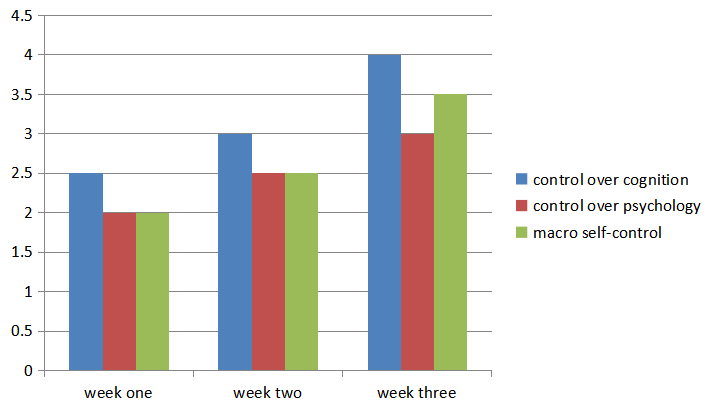備案號(hào):遼ICP備19007957號(hào)-1
![]() 聆聽(tīng)您的聲音:feedback@highmark.com.cn企業(yè)熱線:400-778-8318
聆聽(tīng)您的聲音:feedback@highmark.com.cn企業(yè)熱線:400-778-8318
Copyright ?2015- 海馬課堂網(wǎng)絡(luò)科技(大連)有限公司辦公地址:遼寧省大連市高新技術(shù)產(chǎn)業(yè)園區(qū)火炬路32A號(hào)創(chuàng)業(yè)大廈A座18層1801室
Self-awareness Assignment 2
Introduction
Based on the research and analysis regarding my leadership skills, it has been concluded that among the abilities of social skills, self-control skills, attitude towards authority, self-esteem and self monitoring, my self-control skills are the section that needs to be further improved. Self-control involves one’s ability to restrain the desire, stay concentrated, maintain schedules and follow routines. (Class power point – Self awareness and skills). Low self-control affects individuals’ performances or outcomes in institutions such as school, the labor force and the marriage that they encounter later in life. Those with low self-control are not only more likely to commit crime but also are more likely to be unsuccessful in school, the labor force and marriage.” (Grasmick, H., Tittle, C., Bursik, R. Arneklev, B. 1993). With this regard, it is of great importance and significance to improve the ability of self-control, thus promoting individual’s leadership skills. To focus on the improvement of self-control ability, a realistic skill growth plan should be developed.
Problem Defining
In terms of self-control, there are a series of factors that may have a influence on its development. As for me, my major weakness in self-control embodies lack of control on my cognition towards new things and sound psychology when facing emergency. With this regard, it is necessary for me to develop a plan that contains appropriate method to nurture my awareness of cognition and sound psychology.
Skills Development Plan
When researching the methods that aims to develop the skill of self-control, I found research and study that indicate “negotiation” is an effective form of improving. Since the process of negotiation is deeply influenced by cognitive and psychological factors, which indicates that during the negotiation, participants need to have a high degree of self-control, being clear about the arguments and intention of opponents. Negotiation is affected by cognitive factors, which contribute to develop participants’ ability to invent options. On the other hand, during negotiations, psychological factors like participants’ emotion, relation and perception of the other party also have impacts on the process and outcome of negotiations. Concerning the nature of negotiation and factors that have an influence on negotiation, it can be regarded as an effective method to develop individual’s self-control skills (Stevens, C. K., & Gist, M. E. (1997).
Therefore, in my plan for the development of self-control ability, I would focus on the application of negotiation every week with my friends. The situation of our negotiations can be simulative circumstance like car purchasing, house purchasing or salary negotiation. In addition to the practice of negotiation, my skill development plan will also incorporate self-assessments after each conduction of negotiations. In the assessment of negotiation, there are several important criteria, such as whether negotiators have the ability to make options concerning his or her initiative interests, and whether the participants control his or her emotion and relationship with the other party during the negotiation and so on. Through the self-assessment, me and my partners would rate grades for each other, according to the performance in the negotiation, especially the performance on cognition and psychology. Through the implementation of this plan for two times a week, it is expected that I am able to have a sound control of my awareness of cognition and psychology in tense situations. To be specific, I am able to control my behaviors for the purpose of reaching specific goals.
This skill development plan will be effective on my improvement of self-control skill for the following reasons. To start up, negotiations involve participants’ interests, and positions on particular issues. Through the selection of interests and standpoints, participants should have a good self control on their preference. From this perspective, during the negotiation, participants need to control them to keep on track towards their interest and defend on their position. Therefore, negotiation can be quite effective as for the improvement of self-control ability (Kleef, G. A., Wolfgang, S., Daan, K., Hogg, M. A., & Alicia, S. 2007). In addition, it has been studied that, during the negotiation, type of relationship between parties, types of emotions as well as perceptions of parties have significant effect on the process and outcomes of negotiations. Those factors can be concluded as the influence of psychology, which can be controlled by individuals during the process. From this perspective, negotiation will help individuals to strengthen the ability of self-control.
Component of Improvement
For measuring the improvement, a simple form of questionnaire will be used to objectively and numerically track my personal development of self-control skill. Based on previous research on the criteria that influence the process and outcomes of negotiation, the following factors will constitute the assessment of my achievement on self-control proficiency. Each of the criteria can be assessed with 5 points.
First, before the negotiation, it should be assessed that whether I am clear about my interests and personal preference on the issue. If I can express my interests, I am able to get a higher points of 4 or 5, which indicates that I can have a good control of my personal interests. Second, during the negotiation, it should be assessed that whether I am able to articulate arguments and opinion concerning the negotiation topic, and whether I am able to focus on the topic. If I can get a higher points, it manifests that I am able to control my self on the cognition of the issue that is going on, as well as my self-control on my concentration. Third, during the negotiation, it should be also assessed that whether I am calm or confident enough when being challenged. If I obtained low points on this criteria, it indicates that I am not skilled enough on the self-control of my emotion and psychology. Forth, after the negotiation, there should be an assessment about the outcome of the negotiation. If my position overwhelm the other party, I am able to get a higher point. This criteria aims to assess whether I am able to have a good control over the whole process of the negotiation.
From the analysis of the criteria that affect the achieving proficiency on self-control skill, it can be found that though the implementation of this negotiation-centered skill development plan, I am able to have a good command of various ability that consist of good self-control capacity. For one thing, after the first week of implementation, if I scored 3 points for criteria one mentioned above, and subsequently complete the negotiation practice for another week with an improvement of 1 point higher than previous score, this will constitute a clear improvement in my ability of control personal interests and choice of position, because this indicates an expected level of change in cognitive self-control. Fro another, through the implementation if the skill development plan that mentioned able, if I am able to gain higher and higher scores as for criteria two and three, it indicates that I am able to have a good command of my emotion and relationship with negotiation partners, which constitute an evident improvement in my psychology self- control skill. Last but not least, through weeks of practices and exercises of negotiation, if I am able to gradually gain superior position and gain positive outcomes after negotiations, it can be interpreted that I am able to control the macro situation of the negotiation and keep up with the pace of the negotiations, which can be a great improvement of self-control ability.
Influential Factors for the Plan
Although the plan is effective in terms of its impacts on my self-control skills, there are some influential factors that may pose threats to the failure of the personalized plan, like personal factors like personality, needs, motivations and other situational factors.
In my skill development plan that focus on the application of negotiations, the effectiveness of the plan can be influenced by factors like motivation and personality. Motivation is essential for the development of leadership skills, which is defined as an internal drive that activate behaviors and gives individual directions. The theory of motivation concerns with the processes that describe why and how human behaviors is activated and directed (Mcewan, D., Martin Ginis, K. A., & Bray, S. R. 2013). During the implementation of my skill development plan, motivation can be the most important support for me to gain progress. My control of motivation is realized through cooperation and mutual supervision with my negotiation partners. Through this approach, I am able to gain motivation from myself and my partners, thus ensuring the purpose of skill development. Another influential factor of my personalized plan is personality. I am a person who is open and talkative with people I am close to and familiar with. Therefore, my personality may be presented differently in front of different people I am facing. In the situation of negotiations in my plan, it is hardly possible for me to face the same group of negotiation partners every week, which can be a challenge for my control of personality. To overcome this dilemma, in the first few weeks of exercises of negotiation, I emphasized on the interaction with unfamiliar opponents, nurturing my awareness of active communication with strangers. Through such practices, I am able to have a control over my multi-aspects personality.
Appraisal of Results and Conclusion
After three weeks of implementation of my plan, the improvement of my self-control ability can be illustrated as the following graph.

From the graph above, it can be noticed that through three weeks of implementation, the control over my self cognition ahs been improved obviously from 2.5 points to four points, which meets the first and the second criteria mentioned earlier. Besides, the ability to control my psychology also advanced from 2 points to three points, which indicates that there is still room fro further improvement to meet the third criteria. Finally, through three weeks of practices of negotiation and assessment, my overall self control ability has been improved from 2 points to 3.5 points, which complies with the forth criteria mentioned earlier.
Through the three weeks of implementation of my personalized skill development plan, I noticed that obvious changes have taken place on my behaviors. For instance, when facing sudden changes or emergencies, I tend to be more calm and have a good control over my emotions, managing to find ways out. From the appraisal displayed above and the changes mentioned, it can be concluded that the implementation of my self-control development plan is a success. Concerning the factors that contribute to the success, they can be boiled down as my internal determinations, motivations from external environment, as well as the support of academic research and theories. With this regard, it can be concluded that a sound skill development plan can not go without the supports from theories as well as practices (Zhu, X. 1997).
References
Grasmick, H. G., Tittle, C. R., Bursik, R. J., & Arneklev, B. J. (1993). Testing the core empirical implications of gottfredson and hirschi's general theory of crime. Journal of Research in Crime & Delinquency, 30(1), 5-29.
Kleef, G. A., Wolfgang, S., Daan, K., Hogg, M. A., & Alicia, S. (2007). Group member prototypicality and intergroup negotiation: how one's standing in the group affects negotiation behaviour.. British Journal of Social Psychology, 46(Pt1), 129–152.
Mcewan, D., Martin Ginis, K. A., & Bray, S. R. (2013). The effects of depleted self-control strength on skill-based task performance. Journal of Sport & Exercise Psychology, 35(3), 239-249.
Stevens, C. K., & Gist, M. E. (1997). Effects of self-efficacy and goal orientation training on negotiation skill maintenance. Personnel Psychology, 50, 955-978.
Zhu, X. (1997). Self control skill. Journal of Foshan University.

 24h在線客服
24h在線客服







備案號(hào):遼ICP備19007957號(hào)-1
![]() 聆聽(tīng)您的聲音:feedback@highmark.com.cn企業(yè)熱線:400-778-8318
聆聽(tīng)您的聲音:feedback@highmark.com.cn企業(yè)熱線:400-778-8318
Copyright ?2015- 海馬課堂網(wǎng)絡(luò)科技(大連)有限公司辦公地址:遼寧省大連市高新技術(shù)產(chǎn)業(yè)園區(qū)火炬路32A號(hào)創(chuàng)業(yè)大廈A座18層1801室

499元
一節(jié)課


咨詢電話
咨詢電話:
186-0428-2029

在線咨詢


微信客服

微信咨詢


回到頂部
hmkt088
国产精品久久久国产91| 精品国产95久久久久久无码| 少妇熟女视频一区二区三区| 亚洲成色一色www444狼| 日韩欧美在线观看视频| 国产精品一区二区四av| 男人天堂比V| caoporn一区| 一级做a爱片特黄在线观看| 久久国产亚洲一区二区三区| 久久久九九| 亚洲熟女AⅤ| 岛国精品在线| 成人精品刮子伦一区二区三区网址| 久久看黄片| 久久无码欧美| 91超碰国产福利| 久久精品国产网址| 久久99精品国产麻豆婷婷洗澡| 欧美日韩精品系列| www.91无码| 理论在线观看高清视频中文字幕| 成熟人妻AV无码专区A片麻豆| 人妻无码一区二区三区久久 | 亚洲AⅤ无码久久国产| 色欲AV久久一区二区三区久| 国产天美传媒操逼的视频| www.人人喿| 久久午夜精品人妻一区二区三区| 少妇BBB搡BBBB搡BBBB| 亚洲自拍偷拍综合一区| 操一操超碰| www.91国产久久| 18禁美女无遮挡黄网站免费看视 | 天天干国产| 91久久成人视频一区二区三区| 色导航av| 丝袜亚洲欧美中文无码有码| 欧美日韩不卡高清视频一区| 欧美久久精品| 亚洲成人av不卡一区|